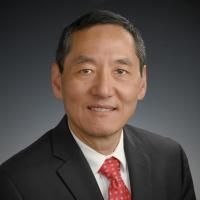Cistrome analysis of YY1 uncovers a regulatory axis of YY1:BRD2/4-PFKP during tumorigenesis of advanced prostate cancer.
Date
2021-05
Journal Title
Journal ISSN
Volume Title
Repository Usage Stats
views
downloads
Citation Stats
Attention Stats
Abstract
Castration-resistant prostate cancer (CRPC) is a terminal disease and the molecular underpinnings of CRPC development need to be better understood in order to improve its treatment. Here, we report that a transcription factor Yin Yang 1 (YY1) is significantly overexpressed during prostate cancer progression. Functional and cistrome studies of YY1 uncover its roles in promoting prostate oncogenesis in vitro and in vivo, as well as sustaining tumor metabolism including the Warburg effect and mitochondria respiration. Additionally, our integrated genomics and interactome profiling in prostate tumor show that YY1 and bromodomain-containing proteins (BRD2/4) co-occupy a majority of gene-regulatory elements, coactivating downstream targets. Via gene loss-of-function and rescue studies and mutagenesis of YY1-bound cis-elements, we unveil an oncogenic pathway in which YY1 directly binds and activates PFKP, a gene encoding the rate-limiting enzyme for glycolysis, significantly contributing to the YY1-enforced Warburg effect and malignant growth. Altogether, this study supports a master regulator role for YY1 in prostate tumorigenesis and reveals a YY1:BRD2/4-PFKP axis operating in advanced prostate cancer with implications for therapy.
Type
Department
Description
Provenance
Subjects
Citation
Permalink
Published Version (Please cite this version)
Publication Info
Xu, Chenxi, Yi-Hsuan Tsai, Phillip M Galbo, Weida Gong, Aaron J Storey, Yuemei Xu, Stephanie D Byrum, Lingfan Xu, et al. (2021). Cistrome analysis of YY1 uncovers a regulatory axis of YY1:BRD2/4-PFKP during tumorigenesis of advanced prostate cancer. Nucleic acids research, 49(9). pp. 4971–4988. 10.1093/nar/gkab252 Retrieved from https://hdl.handle.net/10161/28978.
This is constructed from limited available data and may be imprecise. To cite this article, please review & use the official citation provided by the journal.
Collections
Scholars@Duke

Jiaoti Huang
I am a physician-scientist with clinical expertise in the pathologic diagnosis of genitourinary tumors including tumors of the prostate, bladder, kidney and testis. Another area of interest is gynecologic tumors. In my research laboratory we study prostate cancer, focusing on molecular mechanisms of carcinogenesis and tumor progression, as well as biomarkers, imaging and novel therapeutic strategies. In addition to patient care and research, I am also passionate about education. I have trained numerous residents, fellows, graduate students and postdocs.

G. Greg Wang
Dr. Greg Wang is Full Professor at Department of Pharmacology and Cancer Biology, Department of Pathology (adjunct) and Duke Cancer Institute, Duke University. He received his Ph.D. degree from University of California, San Diego, followed by a postdoctoral training with Dr. C David Allis at Rockefeller University. Before joining Duke in 2023, he has been a full-time faculty member since 2011 at Lineberger Comprehensive Cancer Center and Department of Biochemistry and Biophysics, University of North Carolina (UNC) at Chapel Hill. Dr. Wang’s research programs broadly focus on mechanistic understandings of how chemical modifications of chromatin (including DNA methylation and histone modifications) regulate gene expression and cell fate determination during development, and how their deregulations lead to human diseases, notably cancer. His laboratory recently identified and characterized novel proteins that specifically bind to histone lysine methylation. These histone modification regulators are crucially involved in gene and genome regulation, development, immunity, and/or cancerous transformation. Importantly, discovery of small-molecule inhibitors to target chromatin modulators has become an area of intensive investigation and holds great promise for therapies. Dr. Wang’s research excellence and expertise in the broad fields of chromatin biology and cancer epigenetics have earned him grant funding of NIH and private foundations such as an American Cancer Society Research Scholar, an American Society of Hematology Scholar in basic science, a Janet Rowley Medical Research award from Gabrielle's Angel Foundation for Cancer Research, and a Leukemia and Lymphoma Society Scholar. Greg Wang also receives the recognitions from the institute such as the Philip and Ruth Hettleman Prize for Artistic and Scholarly Achievement (2019, UNC) and the Yang Family Biomedicine Scholar (2020, UNC), as well as the American Society for Biochemistry & Molecular Biology (ASBMB) Young Investigator Award (2021). One of Dr. Wang’s research goals is to yield potential drug candidates with preclinical cancer models, which shall pave a way for translating new therapeutic approaches in future.

Ling Cai
Unless otherwise indicated, scholarly articles published by Duke faculty members are made available here with a CC-BY-NC (Creative Commons Attribution Non-Commercial) license, as enabled by the Duke Open Access Policy. If you wish to use the materials in ways not already permitted under CC-BY-NC, please consult the copyright owner. Other materials are made available here through the author’s grant of a non-exclusive license to make their work openly accessible.
